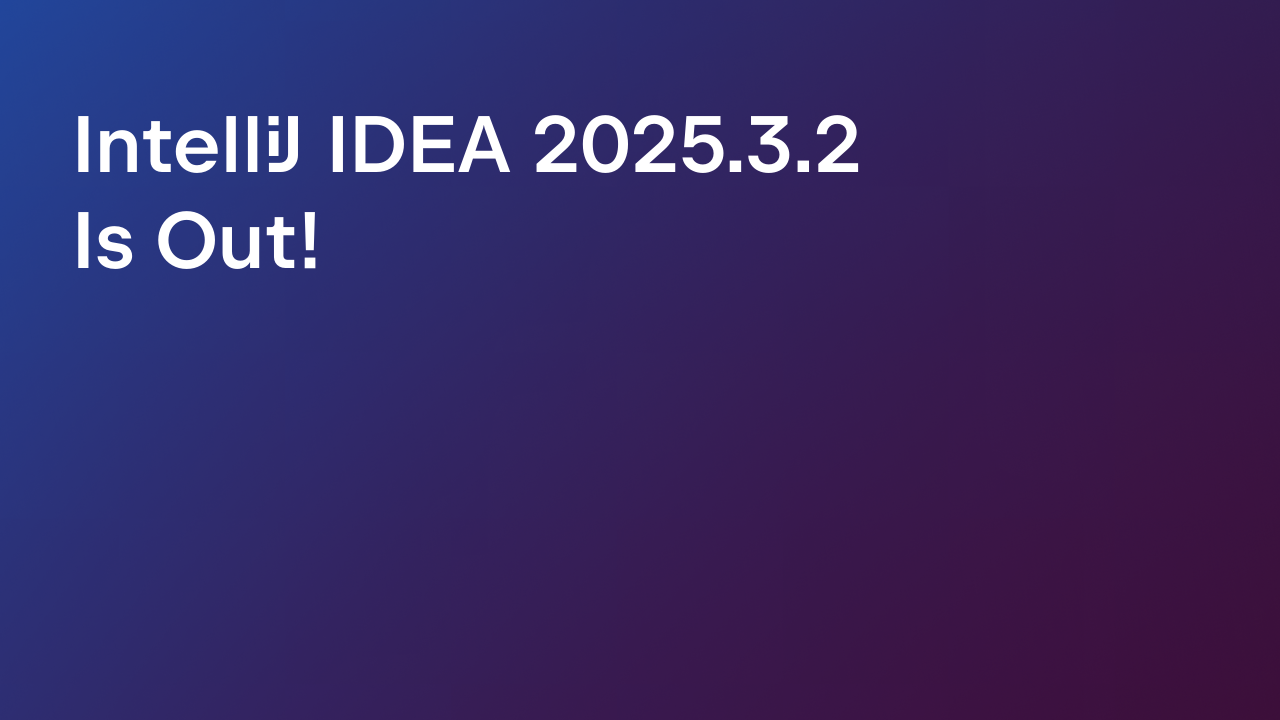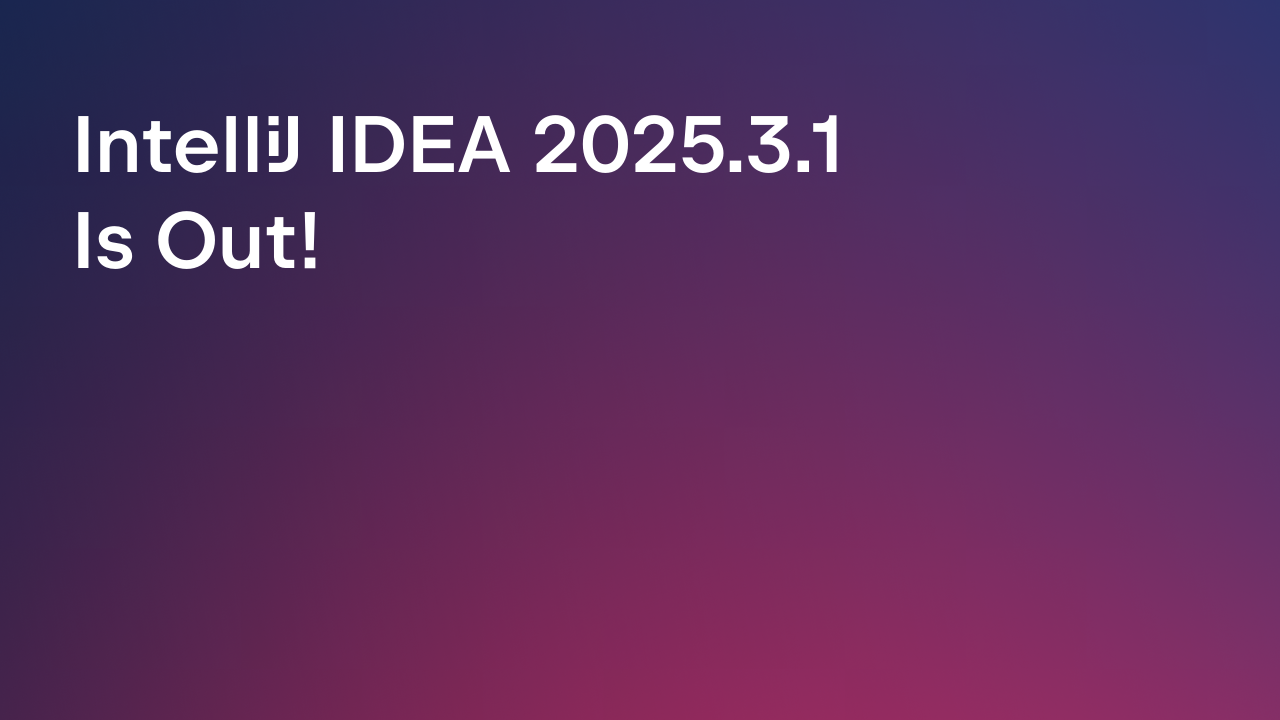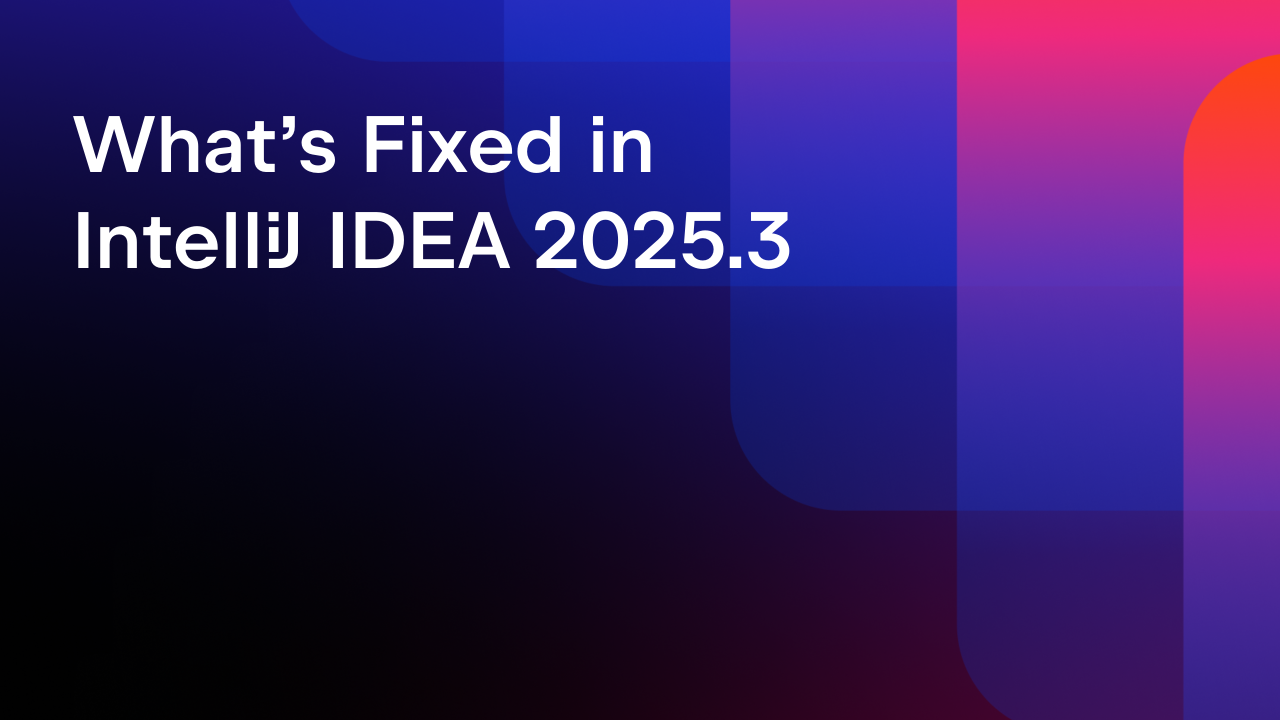IntelliJ IDEA
IntelliJ IDEA – the Leading IDE for Professional Development in Java and Kotlin
IntelliJ IDEA 2023.3 Is Out!
IntelliJ IDEA 2023.3 is here, and it comes packed with an array of new features and enhancements to elevate your coding experience.
You can get the latest build from our website, through the free Toolbox App, or via snaps for Ubuntu.
The IntelliJ IDEA 2023.3 release signifies the continued evolution of AI Assistant, which has now moved beyond the technical preview stage and features a host of exciting improvements. In other areas, this version includes comprehensive support for the latest Java 21 features, introduces an intuitive floating toolbar with editing actions, and adds a Run to Cursor inlay option for an enhanced debugging workflow. Additionally, IntelliJ IDEA Ultimate now provides a seamless Kubernetes development experience out of the box.
See the most important updates in our video overview:
These and many more updates are outlined in this blog post. The detailed descriptions of all the changes are in our EAP blogs and on the What’s New page. Check them out!
Key highlights
- JetBrains AI Assistant is now generally available with a number of new and improved features to increase your productivity in JetBrains IDEs. AI Assistant is a supplemental feature available in IntelliJ IDEA Ultimate with a JetBrains AI Service subscription.
- IntelliJ IDEA 2023.3 provides full support for the latest Java 21 features.
- A new Run to Cursor inlay option makes it easier to execute up to a specific line of code while debugging.
- This release introduces a floating toolbar that appears next to selected code fragments and provides easy access to actions for editing them.
- IntelliJ IDEA Ultimate 2023.3 offers a smooth experience for developing Kubernetes-based applications out of the box.
User experience
- There’s a new option to hide the main toolbar in the default viewing mode.
- The new Default layout option provides a quick way to revert your workspace’s appearance to its default state.
- We’ve introduced color-coding for editor tabs by default, mirroring their appearance in the Project tool window.
- The IntelliJ IDEA icon for macOS has been redesigned to comply with the operating system’s standard style guidelines.
- The Speed Search functionality is now available via a shortcut.
Java
- There’s a new inspection accompanied with a quick-fix for replacing string concatenation with Java 21’s string templates.
- It’s now possible to apply the Move refactoring to local classes.
- We’ve reworked code completion for static methods.
- IntelliJ IDEA’s code analysis now covers more scenarios when identifying and highlighting potential errors in conditional expressions.
Kotlin
- As of v2023.3, support for new Kotlin versions is delivered together with IntelliJ IDEA and Android Studio updates.
- For those new to IntelliJ IDEA and Kotlin, there is an option to open a new project containing sample code. This option now comes with onboarding tips.
- For the IntelliJ build system, you can now create Kotlin projects with concise project structure using fewer nested folders.
- When adding a Kotlin file to a Java Gradle project, IntelliJ IDEA can now automatically configure all the necessary Kotlin dependencies. Learn more.
- The Beta version of the K2 compiler is out. Projects that use the K2 compiler are now fully supported in the IDE.
- IntelliJ IDEA 2023.3 introduces a new way to create Kotlin Multiplatform projects – the Kotlin Multiplatform web wizard.
- With v2023.3, it is once again possible to add Kotlin modules to your project.
Scala
- IntelliJ IDEA 2023.3 offers enhanced Scala 3 support with a particular focus on enums.
- Syntax highlighting for Scala has been refined. The IDE detects unreachable code more accurately, and many red false positives have been eliminated.
- We’ve revamped the workflow for configuring inlay hints for Scala.
- There’s a new X-Ray feature for Scala that you can use to quickly display inlay hints inside the editor only when you need them.
- We’ve introduced a range of UI improvements for Scala, including updates for the Structure and Project tool windows to facilitate code readability.
- We have enhanced IntelliJ IDEA’s support for the Scala CLI in several ways.
- There are improvements to the sbt support.
Version control systems
- It is now possible to create GitLab snippets.
- We’ve implemented a new all-in-one diff viewer that displays all modified files in a single scrollable frame.
Build tools
- Gradle projects now open faster because the IDE no longer automatically downloads source JAR files for all dependencies.
- We’ve enabled the new fast Maven project import mechanics for all projects, including ones created using the older import implementation.
- The IDE now groups Maven project modules based on their qualified names.
- Maven 3.9.3 is now bundled with IntelliJ IDEA.
- The IDE no longer supports Maven 3.0.
Performance
- To boost the IDE’s startup speed, we’ve made the download of shared JDK indexes the default.
The features and enhancements that are introduced in version 2023.3 and designed to facilitate work with frameworks and technologies, Dev Containers, and databases, as well as the features for web development, are accessible in IntelliJ IDEA Ultimate only.
Frameworks and technologies
- We’ve improved the Structure tool window in the HTTP Client to streamline navigation within large
.httpfiles. - The HTTP Client now supports declaring variables using The HTTP Client now supports declaring variables using
@. - Authentication with the OAuth 2.0 Password and Client Credentials grant types is now supported in the HTTP Client.
- The IDE now provides enhanced JSON request body completion in the HTTP Client.
- We’ve implemented visual editing capabilities to help you quickly compose well-formatted OpenAPI specifications using live templates.
- The integrated version of Swagger UI has been updated to 5.0.
- The IDE provides automatic code completion for URL path references.
- The Beans tool window now includes Quarkus and Micronaut components.
- The IDE provides code highlighting, completion, and inspections for the Micronaut expression language.
- We’ve added support for Quarkus Qute type-safe templates.
- You can now use the Run with Coverage and Profile with IntelliJ Profiler run configurations for Quarkus projects.
- The IDE now provides extended support for Spring 6.1 features.
- There’s a new Spring GraphQL plugin that adds several valuable features for developing Spring applications built with GraphQL Java.
- IntelliJ IDEA Ultimate 2023.3 integrates the GraphQL plugin with the HTTP Client.
- It is now possible to add and edit Spring Boot starters via Spring Initializr.
- IntelliJ IDEA Ultimate can now automatically detect and add data source configurations.
- The IDE is now capable of creating Kafka connections in Spring-based applications.
- We’ve introduced initial support for Bicep, an infrastructure-as-code language tailored for Azure.
Remote development and collaboration
- IntelliJ IDEA Ultimate 2023.3 provides extended Dev Container support, including Dev Container Features, Docker Compose support for Dev Containers, and automatic port forwarding. Learn more.
Kubernetes
- IntelliJ IDEA Ultimate 2023.3 offers an enhanced user experience when working with databases hosted in Kubernetes.
- The IDE can now identify references to specific YAML schemas included as comments.
- It is now possible to add
kubeconfigcontexts from a file. - The IDE now offers to automatically install Kubernetes tooling when it is not detected on your computer.
- We’ve improved the workflow for debugging with Telepresence. Learn more.
- We’ve implemented support for top-level
importblocks from version 1.5 of the Terraform configuration language.
Database tools
- IntelliJ IDEA Ultimate 2023.3 integrates the Lets-Plot library for streamlined, no-code data visualization.
- IntelliJ IDEA 2023.3 offers reworked import functionality, marking the completion of the transition to the new Modify Object UI. It is now possible to import to multiple targets and make simultaneous edits.
- This release introduces a number of updates for introspection. Learn more.
- Number formats in the data editor are now customizable.
- In version 2023.3, we’ve introduced highly anticipated support for DynamoDB.
Web development
- This release introduces valuable improvements for TypeScript and Vue 3.
- We’ve implemented new functionality for testing JavaScript code.
- We’ve enhanced the Angular support.
Space integration
- It’s now possible to start coding directly from a repository or code review.
- IntelliJ IDEA 2023.3 now recognizes Maven packages hosted in Space repos and suggests them in the code completion popup.
Other
- Starting with IntelliJ IDEA 2023.3, we’ve made changes to plugin distribution. The Android, Ant, and GlassFish plugins are now available through JetBrains Marketplace. This also applies to the XPathView plugin for IntelliJ IDEA Community Edition.
These are the most notable updates featured in the IntelliJ IDEA 2023.3 release. For a detailed overview of all the changes, we recommend reviewing the release notes.
Your feedback is invaluable to us as we work to improve IntelliJ IDEA. We encourage you to share your thoughts and suggestions on the latest features and updates. Connect with us on X (formerly Twitter) or drop a comment below to let us know what you think. If you come across any bugs while working with the IDE, please report them to our issue tracker.
Happy developing!
Subscribe to IntelliJ IDEA Blog updates







